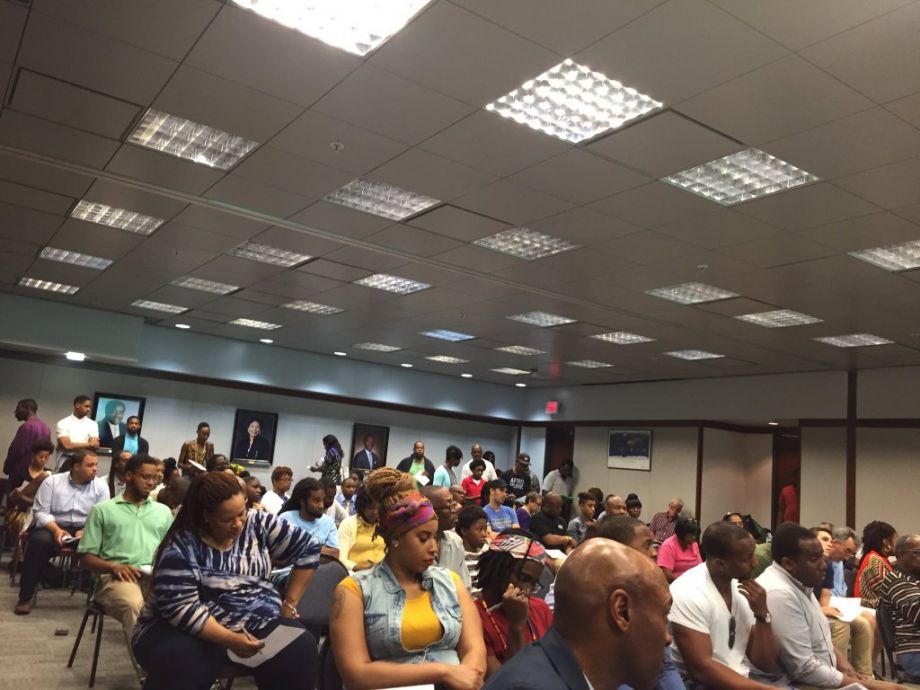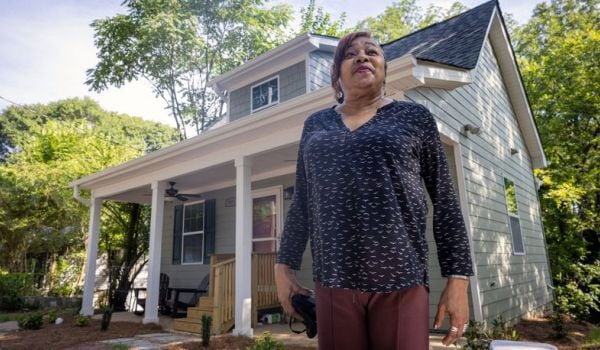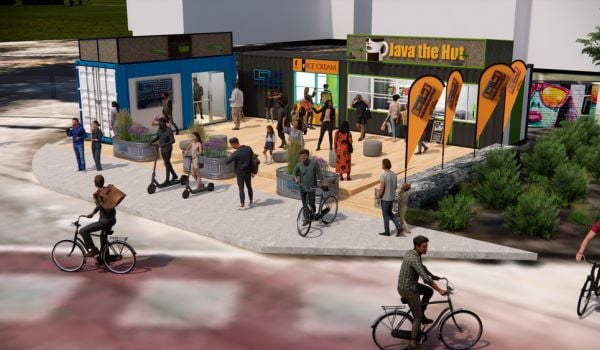Lateef Pyles knew at an early age that he wanted to style hair.
“After going to the barbershop for a few years, I decided that the concept of cutting a fade was something that I was enamored with,” he says. “So I decided to buy a pair of clippers at the age of 12 and started to tear my brother’s head apart.”
Pyles worked on his little brother’s hair until he had enough confidence to go to his neighbors and charge them $5 for a haircut.
Today, Pyles is one of five tonsorial artists (aka barbers) at University Barbershop on Atlanta’s Westside, which first opened in 1956. It’s located in the AUC neighborhood, named after the consortium of historically black colleges and universities all in the area: Clark Atlanta University, Spelman College, Morehouse College and the Morehouse School of Medicine.
Since he began honing his craft, Pyles has learned a barbershop can shape more than hair.
“The barbershop traditionally helps people, mentors kids every once in a while,” says Pyles. “The best way that I can explain it is that the barbershop traditionally has established their relationship with their customers they like to hang out with. Even when a dad comes in with their son, we have our relationship with the son. Traditionally, it’s been that way.”
As one of the newly announced Westside Innovation Fellows at the Center for Civic Innovation, Pyles will get support for the life-shaping aspect of being a barber. The six-month fellowship provides business training, partnerships, mentorship and early stage capital for eight social entrepreneurs on Atlanta’s Westside. Over 120 community members applied, and in May, 44 finalists got to pitch their ideas to community members, who then voted. Four of the fellows are women-led businesses, nearly all aim to create new jobs in the neighborhood, and 75 percent of the fellows live in the neighborhood they are directly serving.
“The project that I’ve been voted to do is really strengthening the areas that the barbershop already does,” says Pyles, who is already mentoring about 12 to 13 young men. With financial and technical assistance from the fellowship, he plans to do more structured outreach to students and other youth in the area, and learn how to rally support to build programming around mentorships.
“I would like to have a place for them to come specifically to get tutoring, to get some type of exposure to jobs, and whatever type of training that the younger kids need,” he says. “So that was basically my pitch, a barbershop that had the mentorship program and a male resource center, all encompassing one building.”
In part because it’s in a men’s barbershop, the mentoring program will focus on men.
“Young men are just recycling in and out of jail,” Pyles says. “I know of a lot of young men that make money in the street and they really wish that they had another skill besides entrepreneurship of selling. If they had another skill, they could use the selling portion along with their skill to probably make the money legally.”
Pyles plans to leverage the barbershop’s diverse clientele, including clergy, academia, finance professionals, professional athletes and more, as a source of inspiration and support for young men with all kinds of career aspirations.
“If a college student is majoring in finance, I connect them to somebody that’s a loan officer in a bank,” says Pyles. “If a college student says they need some mentorship based on a dream that they have, they want to be a reverend, maybe I can connect them with one of the reverends that come to the barbershop and they can have some mentorship or a little bit of guidance to help them with their life plan.”
Pyles emphasizes it’s about careers, not just jobs.
“I don’t like to use the word jobs,” he says. “There’s an acronym for J-O-B meaning Just Over Broke. I’m more into finding ways to create income and the ‘job’ title is so limiting to that concept.”
The Westside Innovation Fellows program is a partnership between the Center for Civic Innovation and the Arthur Blank Family Foundation. The foundation sought out the Center for Civic Innovation to work with the community to identify promising ideas, then match those ideas with outside resources to get them moving toward greater impact. Since its founding in 2014, the Center has worked with social entrepreneurs all around Atlanta to support them in different ways.
The Center interviewed each of the 120 applicants in person. “We knew, from even just other application processes, that the application doesn’t fully always tell the story of the entrepreneur,” says Rohit Malhotra, the Center’s founder and executive director.
After interviews, they narrowed the field down to the 44 finalists. “We did a rubric where our team was able to evaluate, number one, can we help these folks? Are they a good fit for this program? Is it sustainable? Is it scalable? Does it have a community component? Does it actually create jobs?” Malhotra explains.
Then they opened it up to the community, giving the finalists two minutes each to pitch their ideas to residents at three separate forums in May. The community got to vote on which ideas they liked best. “We gave the community 60 percent of the weight and our internal team 40 percent of the weight, and that’s how we selected our top eight ventures,” Malhotra says.
The Westside Innovation Fellows are just one piece of a larger $30 million community benefits plan between Arthur Blank, owner of the NFL’s Atlanta Falcons, and the city of Atlanta, as part of approving construction and $200 million in municipal bonds for a new stadium.
The new stadium is right next to the current stadium, on Atlanta’s Westside, adjacent to the AUC neighborhood. The old stadium also had some community benefits tied to its construction. “I wouldn’t say it was a fail, but there were some challenges with that experience,” Pyles says.
To coordinate the community benefits plan and broader community development initiatives, the Blank Family Foundation brought in Frank Fernandez, who previously spent 15 years doing community development in Austin, Texas. He came on board about two and a half years ago.
“To be able to really help create and facilitate the kind of change everyone wants to see, it’s going to have to be a mix of actors from the inside, groups and residents and leadership from the neighborhood,” says Fernandez, vice president for community development at the foundation. “But also bringing in outsider experts and expertise and providers. We’ve been trying to think through what is a good balance of that.”
Fernandez says the foundation would consider investing further if there’s traction for any of the ideas. In the meantime, he’s working to spread the gospel of inclusive community development.
“Like anything else, it’s a mixed bag. We have 12 to 14 founding partners [in the community benefits plan]. Some completely get it, they’re already on board,” Fernandez says. “Some you need to bring them along a little bit because they just haven’t done that before. To me, that’s part of my job is to get them there, to see the value of it, why it’s important, why it hopefully makes things more impactful and effective.”
The Equity Factor is made possible with the support of the Surdna Foundation.

Oscar is Next City's senior economic justice correspondent. He previously served as Next City’s editor from 2018-2019, and was a Next City Equitable Cities Fellow from 2015-2016. Since 2011, Oscar has covered community development finance, community banking, impact investing, economic development, housing and more for media outlets such as Shelterforce, B Magazine, Impact Alpha and Fast Company.
Follow Oscar .(JavaScript must be enabled to view this email address)

















